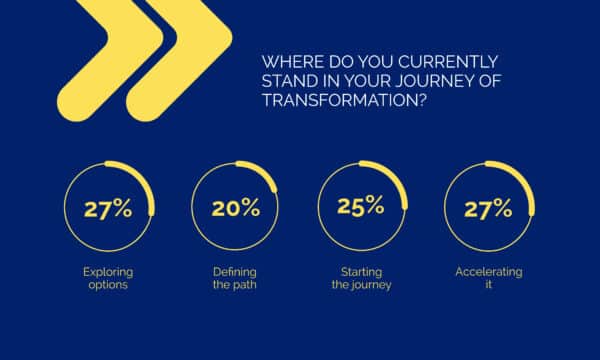The revival in air travel continues strongly, but with the potential for more disruption possible in 2024, Accelya experts advise airlines to continue to develop their retailing in our Offer and Order Transformation webinar, writes Barbara Moreno
Pulling the profitability levers
The global aviation industry has carried the momentum of 2023 into the new year, with bookings continuing to move back towards 2019 levels. With a number of clouds on the horizon, however, airlines continue to need to work smart to deliver healthy profit margins.
It was a good moment then for me to catch up with two Accelya experts to discuss the strategies available to airlines to optimize their commercial operations to strengthen revenues and profitability.
Bill Cavendish and Jonathan Newman from our Global Business Development team joined me for our webinar, How Distribution Changes Are Accelerating The Need For Offer and Order Transformation. During a lively discussion that included answering questions from customers they explored the challenges facing the industry and the solutions available to them.
Bill Cavendish set the scene, explaining that with IATA forecasting industry profitability margins of just 2.7% in 2024, airlines needed to be wary of the potential impact of geopolitical volatility. With conflict in Europe and the Middle East, airlines faced an uncertain outlook and the potential for disruption in issues such as oil prices and possible impediments to trade. “That uncertainty really is out there,” he said. “We don’t know exactly what that means for travel, but it will have an effect.”
Jonathan Newman agreed, arguing that with supply constraints impacting the availability of new aircraft, limiting the potential for organic revenue development, airline executives needed to look elsewhere for commercial momentum.
“That’s why the focus on retailing and the making use of the available levers that commercial leaders have is really important. It’s critical to get right, both from a strategic and cost perspective,” he said.
Distribution management and product are key profitability drivers
Accelya has identified four levers with the potential to have an “outsize” impact on margin: Distribution Management; Incentives and Commission; Merchant strategy; and Product. While all four are important, the webinar focused on Distribution Management and Product as key.
“Commercial airline leaders really do need to understand the importance being flexible in how you distribute,” Cavendish said. “And then of course attached to that is the product that you want to put out into the market.”
With leisure travel returning quicker after Covid than business travel, airlines have been seeing a rise in sales through direct channels, which as Cavendish said, offer them greater control of their offer, improved commercial, marketing and loyalty opportunities, and improved ancillary sales.
“And so what we’re seeing with our airline customers is that they really want to leverage technologies and commercial models that NDC has facilitated to level up those indirect channel capabilities through a richness of offer to get closer to the value of direct sales channels,” he said.
Distribution is a fast-evolving arena – and the impact is positive
Our experts identified a number of macro changes to the distribution landscape that were changing the industry’s commercial dynamic. Among these are a decline in the number of full content agreements being signed with the traditional GDS’, variations in content availability, travel sellers paying for access to content, and the emergence of new aggregators. As Cavendish put it, “commercial relationships that really had been static for a very long period of time, are starting to evolve, and evolve quickly”.
The knock-on effect for airlines is financially beneficial to airlines.
“There’s a big revenue impact from this evolution in the distribution landscape,” Newman said. “That’s in part because of ancillaries, and not just in number and type but also the attachment rate and average prices, and we see continued increases in both.”
Newman said that the increased use of merchandising tools and other modern distribution technologies is also leading to the greater use of continuous and dynamic pricing, “which is having a really big impact on airline revenues… and there’s a considerable cost efficiency”.
Hitting the inflection point for Order Transformation
Growth in ancillary volumes is indicative of two trends, the move to direct channel sales and the rapid adoption of NDC. These in turn are leading to what our speakers call the “inflection point”, as rapid changes in the commercial landscape collide with legacy back-end systems that are unlikely to be optimized to deal with them.
Newman said he believes that airlines need to be aware of the “inflection points”, and that “airlines should be thinking today and starting to plan for when they’re going to reach”.
Cavendish argues that as that moment arrives, it’s important airlines think about ‘the what’, including, “the value drivers you can extract from effective selling, servicing and settling of new products in an order centric environment”. Also critical, he continued, are the transformational aspects, including the readiness of commercial and technological teams, that can be upskilled to deliver a new approach.
Cavendish acknowledged that this can be a daunting challenge for airlines but reassured airlines that change need not take place overnight and that technology partners such as Accelya would be able to support them at the pace of change that their situation demanded.
The imperative for change
During the webinar we conducted snap surveys to ask customers where they were on their transformation journey and what the obstacles holding them back were.

While there was a broad range of positions, with respondents just as likely to be “starting the journey” as “accelerating it”, there’s also a degree of homogeneity, with some airlines even voting for both. Equally the obstacles, “cost”, “internal knowhow” and a “customer engagement plan” illustrated a broad range of challenges.
These responses matched our experts view that transformation is rarely quicky, easy or uniform. Nonetheless they were united in their view that airlines should begin the transformation soon, arguing pressure from changing customer expectations as well as shareholders would drive imperative for change.

And, of course, wherever you are in your journey, Accelya has the expertise and the portfolio to get you started or accelerate the journey and our experts like Bill Cavendish and Jonathan Newman are ready to take your call.
Those are just the headlines from a stimulating hour of discussion. To hear more, a replay of the webinar is available here:

